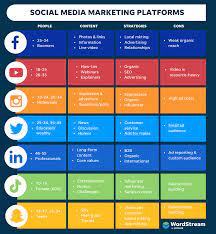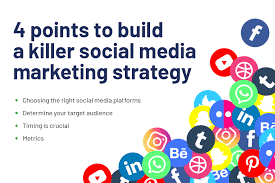Crafting an Effective Social Media Marketing Plan for Online Success
The Ultimate Guide to Creating a Social Media Marketing Plan
Social media has become an integral part of any successful marketing strategy. With billions of users worldwide, platforms like Facebook, Instagram, Twitter, and LinkedIn offer unparalleled opportunities to reach and engage with your target audience. However, to make the most of social media marketing, you need a well-thought-out plan. Here’s how you can create an effective social media marketing plan:
Set Clear Goals
Before diving into social media marketing, define your goals. Whether it’s increasing brand awareness, driving website traffic, generating leads, or boosting sales, your goals will shape the rest of your strategy.
Know Your Audience
Understanding your target audience is crucial for crafting relevant and engaging content. Conduct market research to identify demographics, interests, and online behaviours of your audience.
Choose the Right Platforms
Not all social media platforms are created equal. Select the platforms where your target audience is most active and tailor your content accordingly.
Develop a Content Strategy
Create a content calendar outlining what type of content you will post and when. Mix up your content with images, videos, blog posts, infographics, and user-generated content to keep your audience engaged.
Engage with Your Audience
Social media is a two-way street. Respond to comments, messages, and mentions promptly to build relationships with your followers.
Monitor and Analyse Performance
Track key metrics like engagement rates, click-through rates, conversions, and follower growth to evaluate the success of your social media efforts. Use analytics tools to gain insights into what’s working and what needs improvement.
Adjust and Optimise Your Strategy
Social media is constantly evolving. Stay agile by monitoring trends in the industry and adjusting your strategy accordingly. Experiment with different types of content and posting schedules to find what resonates best with your audience.
In Conclusion
A well-crafted social media marketing plan can elevate your brand’s online presence and drive tangible results for your business. By setting clear goals, knowing your audience, creating engaging content, and analysing performance data regularly, you can build a strong social media presence that connects with your target audience effectively.
Six Essential Tips for Crafting an Effective Social Media Marketing Plan
- Identify your target audience and tailor your content to appeal to them.
- Create a content calendar to ensure consistent posting and engagement.
- Utilize various social media platforms to reach a wider audience.
- Engage with your followers by responding to comments and messages promptly.
- Analyse the performance of your posts using analytics tools to refine your strategy.
- Collaborate with influencers or other brands for increased visibility and credibility.
Identify your target audience and tailor your content to appeal to them.
Identifying your target audience is a fundamental step in creating a successful social media marketing plan. By understanding the demographics, interests, and behaviours of your audience, you can tailor your content to resonate with them effectively. Personalising your messaging and content to address the specific needs and preferences of your target audience not only increases engagement but also builds a stronger connection with your followers. This strategic approach ensures that your social media efforts are focused and impactful, ultimately driving better results for your brand.
Create a content calendar to ensure consistent posting and engagement.
Creating a content calendar is a crucial tip for an effective social media marketing plan. By planning and scheduling your content in advance, you can ensure consistent posting and engagement with your audience. A well-organised calendar allows you to maintain a steady flow of relevant and engaging posts, helping you stay on track with your social media strategy and build a stronger connection with your followers. Consistency is key in establishing brand presence and fostering meaningful interactions on social media platforms.
Utilize various social media platforms to reach a wider audience.
To maximise the impact of your social media marketing plan, it is essential to leverage a diverse range of social media platforms. By utilising platforms such as Facebook, Instagram, Twitter, LinkedIn, and others, you can effectively expand your reach and engage with a broader audience. Each platform offers unique features and caters to different demographics, allowing you to tailor your content and messaging to resonate with a wider spectrum of users. Embracing multiple social media channels not only increases your visibility but also enhances brand awareness and fosters meaningful connections with potential customers across various online communities.
Engage with your followers by responding to comments and messages promptly.
Engaging with your followers by responding to comments and messages promptly is a crucial aspect of a successful social media marketing plan. By actively interacting with your audience, you not only build trust and loyalty but also show that you value their input and feedback. Prompt responses demonstrate that you are attentive to their needs and willing to engage in meaningful conversations, fostering a sense of community around your brand. This two-way communication can lead to increased engagement, brand advocacy, and ultimately, stronger relationships with your followers.
Analyse the performance of your posts using analytics tools to refine your strategy.
By analysing the performance of your posts through analytics tools, you can gain valuable insights that will enable you to refine and enhance your social media marketing strategy. Understanding key metrics such as engagement rates, click-through rates, conversions, and follower growth allows you to identify what resonates with your audience and what areas may need improvement. This data-driven approach empowers you to make informed decisions, optimise your content, and ultimately achieve greater success in reaching and engaging with your target audience effectively.
Collaborate with influencers or other brands for increased visibility and credibility.
Collaborating with influencers or other brands can significantly enhance the visibility and credibility of your social media marketing efforts. By partnering with influencers who have a strong following in your target niche or teaming up with reputable brands, you can tap into their existing audience and leverage their credibility to boost your own brand’s reputation. These collaborations not only widen your reach but also establish trust among potential customers, as they see your brand endorsed by personalities or companies they already trust. This strategic partnership approach can lead to increased brand awareness, engagement, and ultimately, conversions, making it a valuable tactic in any social media marketing plan.

